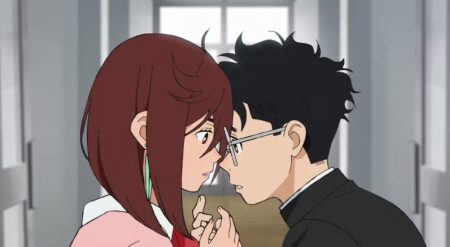Be Melodramatic, or Melo is My Nature as it also goes by, premiered in August 2019, on South Korean network JTBS, and as you may have guessed by the name, it’s a melodrama, but not your typical Melo (I wonder how many times I’ll end up using the word “Melo” in this piece?). Like many dramas produced in recent years, Be Melodramatic has a female lead ensemble cast that focuses on the struggles, joys, and triumphs of its three main protagonists, who all work in various fields of the entertainment industry.
Im Jin Joo (Chun Woo Hee) who aspires to have her own script produced, as she works as an assistant writer for Jeong Hye Jeong (Baek Ji Won) one of the top screenwriters in the industry. Lee Eu Jung (Jeon Yeo Bin) is a documentarian who’s life has practically come to a standstill after a devastating loss, and Hwang Han Joo (Han Ji Eun), is learning how to find a balance between her recent promotion to head of marketing at an ad agency, and being a single mother.
Another great character that rounds out the main cast is Lee Hyo Bong (Yoon Ji On), their close friend and roommate, who works as a music producer for dramas. Hyo Bong is a major step forward in inclusivity in Korean dramas not only because he’s gay but also because the relationship with his boyfriend is shown and not just hinted at with vague lines of dialogue. The way this part of him isn’t made a big deal of and is causally mentioned as a normal part of, like being a musician, is a huge and important step in K-dramas.
What makes Be Melodramatic so special to me is how evident the empathy and heart that was put into the show by everyone involved is. Because the story focuses a lot on grief, sexism, loneliness, and various types of insecurities, it is very clear that the cast and creative team made sure to be extra careful in how the dialogue was written and delivered. Apart from the emotional aspect, Be Melo is very unique in how the story is told. Viewers are given a very intimate look into the characters’ lives and thoughts during certain moments when the Fourth Wall is broken, not only by the main characters but also by supporting and background characters.

I have to confess that more than one of these scenes, in particular, made me misty-eyed. I felt it when they said “I love you” to the viewer. (I’m a sap, so what about it?). Having one of the writers serve as co-director created a sense of completeness and surety to how the story flowed and was necessary with what I call plot inception. To make it easy to understand, Be Melodramatic‘s plot follows a script Jin Joo is developing with famous drama director Son Beom Soo (Ahn Jae Hong), titled “When You Turn Thirty, It Will Be Fine.“, which follows the lives of three thirty-something female friends, and the people they interact with.
The characters and their struggles are very relatable. If you experience imposter syndrome and self-doubt when struggling to have your voice heard as a creative woman, Jin Joo is your avatar. As a writer, she knows what she wants to say and is determined to have others see and hear her. But when her own boss, a woman, fails to give her encouragement and production companies turn down her script, she has to overcome her insecurities to keep pushing forward. From their first encounter, Beom Soo dismisses Jin Joo’s aspirations, and his generally rude behavior provides a hurdle, but one that she can overcome.
As Jin Joo and Beom Soo develop the script and try to develop it at JBC (an obvious substitute for JTBC), the events in their real lives influence the plot and vice versa. Many of the comedic moments come from situations that were clearly influenced by real-life events of the writers and directors…or at least from people they know. I really enjoyed this aspect of the show because it gave a bit of a behind-the-scenes look at how dramas are made. From the writer’s ‘A-ha!’ moment, fighting for narrative control with directors and production companies, to the making of the Original Song Track, or OST, as drama fans call them.
Along with all of the laughs and funny songs, Be Melodramatic deals with some very heavy topics, one in particular that I related to on a very personal level. Following a devastating loss, Eu Jung experienced severe depression, and after a period of time, it seemed as though she had come back to her old self, and she did…but not fully. When I first watched Be Melodramatic, I was recovering from craniotomy surgery to remove a lytic tumor in my skull. I was very tired emotionally and mentally from everything I had been experiencing leading up to the surgery. And the one thing I wasn’t expecting was to see the grief and depression I was experiencing portrayed in this show. Though my circumstances weren’t the same as Eu Jung’s, I felt very connected to how she was drifting through life.

Eu Jung was there. She spoke to her friends, smiled, laughed, did chores, and worked, but she wasn’t present…and I saw how I was doing the same because I recognized the grief and depression. For a very long time, I had been going through the motions of living my life, but I wasn’t always living my life. I had previously watched films like The Farewell, which helped me to begin processing my grief (and wrote about), but the way Jeon Yeo Bin and the writers portrayed the intensity of what I was feeling took my breath away.
With all the glowing comments I can give Be Melodramatic, there is one thing about it that still bothers me, and it’s the way the relationship between Chu Jae Hoon (Gong Myung) and his ex-girlfriend. With everything thing that was done right by showing how the other characters were facing challenges, I think the ball was dropped with Jae Hoon. There was a chance to give a bit more time to explore how men are victims of abuse in romantic relationships like he was.
Though she wasn’t physically abusive, Jae Hoon’s ex was verbally and mentally abusive towards him with her constant belittlement, manipulation, and gaslighting. In certain moments it felt as though the writers were being overly cautious by not explicitly stating that it was abuse. Instead, they made subtle hints, which in some circumstances works (as it does in One Spring Night), but in this case, it felt like a failure was disappointing. Perhaps one day, we’ll get a show that explores this more fully and with thoughtfulness.
One of the things that has always intrigued me about K-Dramas is how good they are at melding humor with sadness, and Be Melodramatic is a great example of this. Moments that call for the characters (and audience) to be reflective are never cut or cheapened for the sake of humor. For the humor that does occur in these moments, they fit effortlessly by serving as reminders that even in sorrow there is still hope.
I would recommend Be Melodramatic to anyone who is looking for a show with heart and compassion. K-Dramas continues to show that it doesn’t matter where we’re from or what we look like; everyone has struggles. There’s a beauty in seeing that we’re not alone, and the people who can get us through tough times with love, patience and understanding can either be those we’ve known for years or even just a few days. We’re all melodramatic in our own way, and that’s ok.







